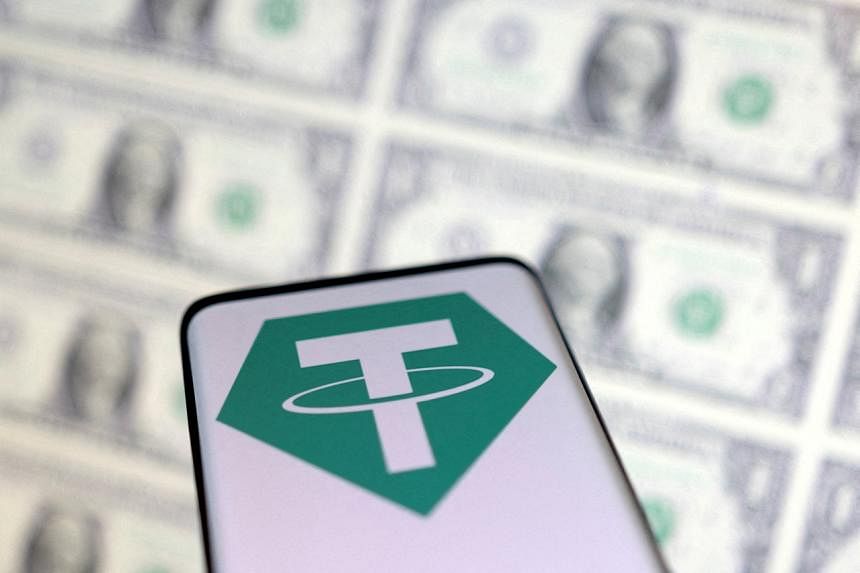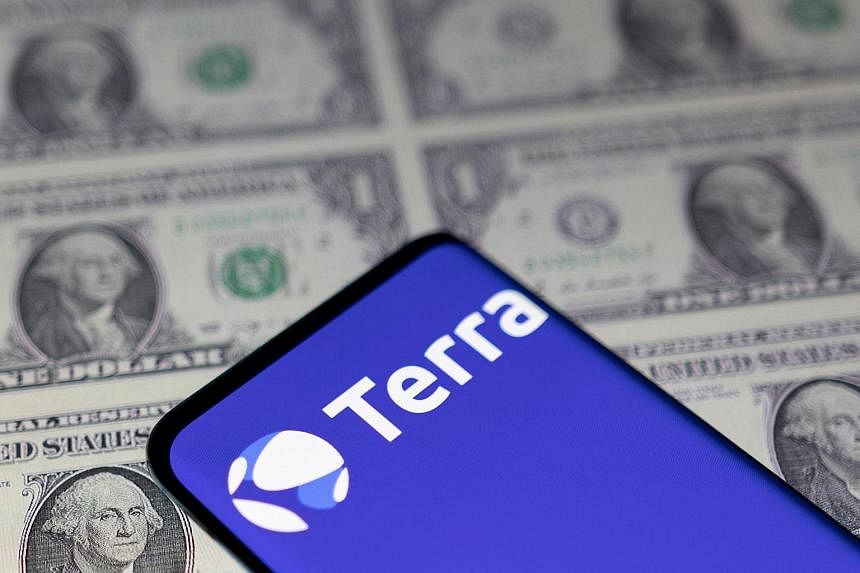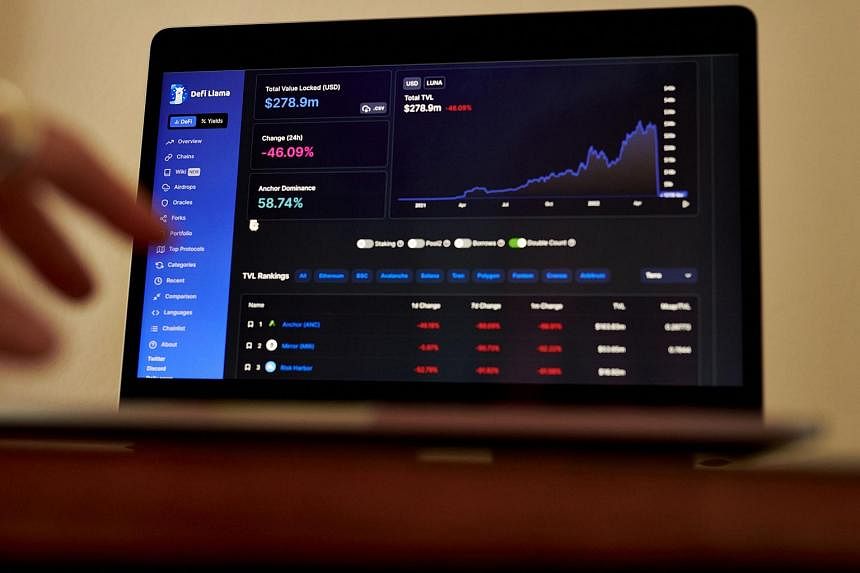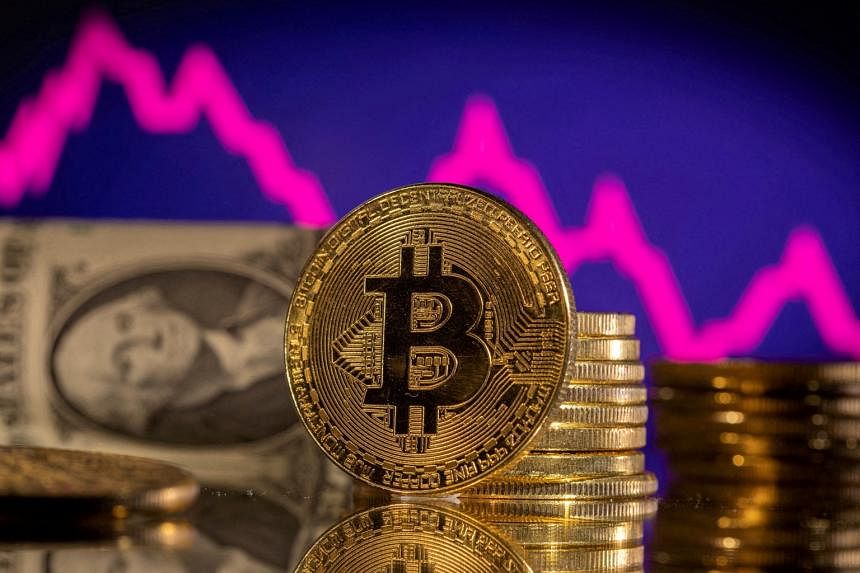Trouble at US$10b crypto hedge fund Three Arrows sparks contagion fears
Representations of Ripple, Bitcoin, Etherum and Litecoin virtual currencies on a PC motherboard on Feb 14, 2018. PHOTO: REUTERS
JUN 20, 2022
BEIJING (
CAIXIN GLOBAL) - Rumours of cryptocurrency hedge fund
Three Arrows Capital being on the brink of insolvency have sent shock waves through the crypto space, with industry observers predicting more trouble for the decentralised finance (DeFi) sphere as contagion spreads.
Three Arrows, also known as 3AC, is one of the highest-profile players in DeFi - a crypto ecosystem aiming to bypass traditional financial intermediaries through blockchain technology. With an estimated US$10 billion (S$13.86 billion) in assets under management (AUM) in March according to blockchain analytics platform Nansen, the fund has invested in a number of crypto and DeFi firms.
One of the most popular activities in DeFi is holders of crypto assets, such as Ether (ETH), borrowing crypto loans from lenders by staking the assets as collateral, which Three Arrows has aggressively employed, pushing up its collateral positions.
The company, which moved its headquarters to Dubai from Singapore, had heavy exposure to staked ETH, or stETH, a derivative token offered by DeFi app Lido Finance that can be redeemable for exactly one ETH following an upgrade to the Ethereum network.
However, the recent meltdown of the crypto market has rapidly dragged down the value of tokens including ETH. Concerns about further declines have driven an increasing number of holders to swap stETH into ETH and cash out the latter, with selling pressure leading stETH to "depeg" from its relationship with ETH, and causing ETH to slump further. Three Arrows' ETH collateral positions now face forced liquidation, which happens when the ETH price drops below a certain threshold and more collateral cannot be provided by the firm.
Prices of ETH, the second-largest cryptocurrency by market cap after Bitcoin, breached the US$1,000 mark on Saturday (June 18) Beijing time, down more than two-thirds since early April and marking the lowest since January 2021, according to data provider CoinMarketCap.
Liquidity woes
Signs that Three Arrows may be trying to raise funds to ease its financial trouble appeared when it began making a number of withdrawals from multiple DeFi platforms. In May, the company withdrew nearly US$400 million worth of stETH and ETH from decentralised exchange Curve Finance, according to data provided to Caixin by Nansen, which has been tracking a wallet it had tagged to the hedge fund.
Then on Tuesday, Three Arrows withdrew more than 80,000 stETH from DeFi lending platform Aave, and swapped 38,900 stETH for 36,700 ETH, representing a loss of 2,200 ETH. It continued to sell off the remaining stETH on Thursday and Friday on decentralised exchange 0x, according to Nansen's data. Since this is only one of the many wallets owned by Three Arrows, the overall scale of the fund's holdings and hence its selling could be much larger.
Some crypto analysts said Three Arrows' efforts to dig itself out of the liquidity crisis could prove futile. "It's obvious that Three Arrows is trying to save itself by selling ETH to repay loans such as stablecoins, but it could all be too late because it borrowed too much money and the selling pressure will further knock down ETH prices - a vicious cycle has already been created," Jiang Jinze, founder of Muse Labs, told Caixin. "This feels like a death spiral."
On Wednesday, Three Arrows co-founder Zhu Su said on Twitter that they "are in the process of communicating with relevant parties and fully committed to working this out," without providing details.
However, one of the fund's clients, Hong Kong-based crypto trading firm 8 Blocks Capital, has called out Three Arrows for misappropriating around US$1 million of its funds to answer margin calls. The firm's CEO, Danny Yuan, said in a tweet that his team had not been able to reach Three Arrows in recent days.
"What we learned is that they were leveraged long everywhere and were getting margin-called. Instead of answering the margin calls, they ghosted everyone. The platforms had no choice but to liquidate their positions, causing the markets to further dump," Yuan wrote on Thursday.
Three Arrows' troubles also spread to Finblox, a Hong Kong-based platform that allows investors to earn high yields through lending out their crypto assets. On Thursday, the firm said they would reduce withdrawal limits, citing concerns surrounding Three Arrows, which is an investor in the platform.
Zac Prince, CEO at New Jersey-based crypto lender BlockFi, said on Twitter Friday that it has liquidated "a large client that failed to meet its obligations on an overcollateralised margin loan," without naming the firm. Three Arrows, which made a strategic investment in BlockFi in 2020 and exited the next year, was a client of the lender, according to an April 2020 press release posted on the lender's website.
US-based Genesis Global Trading CEO Michael Moro also said in a Twitter thread on Friday that the crypto brokerage "mitigated our losses" with a large counterparty that failed to meet a margin call earlier in the week. Moro said Genesis sold and hedged all of the liquid collateral from the counterparty to minimise any downside and that no client funds were affected.
Neither Zhu nor co-founder Kyle Davies has responded to Caixin's requests for comment. In a report published by The Wall Street Journal on Friday, Davies said Three Arrows is exploring options including asset sales and a rescue by another firm.
Mark, co-founder of venture capital firm Wagmi Ventures, predicts the size of Three Arrows' AUM to plunge by between 70 to 80 per cent. Being a heavy investor in the Luna token, which lost almost all of its value in a collapse in May, Three Arrows had already suffered significant losses.
Some observers believe that the impact of Three Arrows' turmoil on retail investors should be limited - at least for now. "I think retail investors should be safe for now and aren't under too much pressure to dump their assets. The current situation would mostly impact institutional investors," Muse Labs' Jiang said.
"Generally, it's not a good look for the industry, but at the same time, Three Arrows is a prop shop. So there shouldn't be a whole lot of 'retail financial contagion,'" Will Corkin, co-founder of Hong Kong-based DeFi platform Mantra DAO, told Caixin.
"Three Arrows has been borrowing from institutions, and this loss should not involve retail investors. At the same time, their counterparties are relatively concentrated, meaning that the negotiation process would be relatively smoother," Yang Mindao, founder of crypto lending platform dForce, told Caixin.
Contagion spreads
The global cryptocurrency market cap, which peaked at US$3 trillion in November, dropped to below US$900 billion on Saturday, according to CoinMarketCap. The turmoil in the crypto space comes as US stocks entered a bear market earlier this week, with the S&P 500 Index declining more than 20 per cent from its recent peak in January.
Observers believe stock market declines would only add to the woes of the crypto industry, which had already witnessed two high-profile blow-ups since May. First, the collapse of the Terra ecosystem when its algorithmic stablecoin TerraUSD crumbled from its dollar peg has taken down its sister token Luna.
Then about a month later, Celsius Network LLC - a widely used centralised crypto lending platform that had offered depositors a sky-high 18.63 per cent annual percentage yield -
froze customer withdrawals, swaps and transfers between accounts, citing "extreme market conditions." The lender said on its website that it has 1.7 million users.
As forced liquidation of large volumes of collateral will send cryptocurrency prices down even faster, a domino effect could be created across the industry that could spell trouble for many more crypto platforms and investors.
"Many of these crypto firms haven't been around for long - they were established in 2019 or 2020, and haven't fully experienced many rounds of bull-to-bear market transitions. In my opinion, many of them are relatively inexperienced in risk management and leverage control," Muse Labs' Jiang said.
"Three Arrows won't be the last to blow up. Many small exchanges and quantitative funds have put all their money in stETH or centralised finance firms (such as Celsius). They generate high returns, but at the same time, it's risky," Wagmi's Mark, who only gave his first name, told Caixin.
Hong Kong-based Babel Finance became the latest major crypto lender to freeze withdrawals, saying on Friday that it is facing "unusual liquidity pressures" amid major fluctuations in the crypto market.
"The continued deleveraging in the industry as a result of various liquidations will shrink overall credit in the system and deplete liquidity," Ross Liang, a blockchain analyst at Hong Kong-based crypto asset manager Amber Group, told Caixin.





















